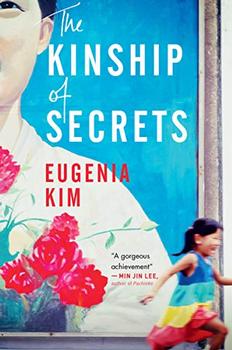Reading Guide Questions

Please be aware that this discussion guide will contain spoilers!
In 1948 Najin and Calvin Cho, with their young daughter Miran, travel from South Korea to the United States in search of new opportunities. Wary of the challenges they know will face them, Najin and Calvin make the difficult decision to leave their infant daughter, Inja, behind with their extended family; soon, they hope, they will return to her.
But then war breaks out in Korea, and there is no end in sight to the separation. Miran grows up in prosperous American suburbia, under the shadow of the daughter left behind, as Inja grapples in her war-torn land with ties to a family she doesn't remember. Najin and Calvin desperately seek a reunion with Inja, but are the bonds of love strong enough to reconnect their family over distance, time, and war? And as deep family secrets are revealed, will everything they long for be upended?
Told through the alternating perspectives of the distanced sisters, and inspired by a true story,
The Kinship of Secrets explores the cruelty of war, the power of hope, and what it means to be a sister.
Discussion Questions
- In the opening chapter, Inja refers to her family in America as "shadow people" and as "ghost people to whom she was bound"
(4). Discuss what she means by this. In what ways are they alive to her, and in what ways are they not?
- On page 27, Najin writes a letter to her mother in which she
states "I know I have failed two daughters and I have failed my
husband. What use is it to regret leaving a baby? What use is it
for this evil mother?" What do you think Najin means when she
asks, "what use is it to regret leaving a baby"? And why do you
think she sees herself as "an evil mother"? In what different ways
do Najin and Calvin grapple with the separation of their family?
- The structure in the beginning of the book—which alternates
between the family in the U.S. and the family in Korea—allows
us to see the two girls grow up side by side. What did you make
of this? On page 59, Najin says, "I mustn't forget that each child
is a mirror of another in some way." How do Inja and Miran
make sense of and respond to their separation? How are their
responses similar? And how are they different?
- Discuss the leather-bound diaries that Najin keeps and in which Miran, at her mother's request, keeps
detailed inventory of each package sent to Korea. Why do you think Najin wants these records? What
might they offer?
- On pages 80-81, Uncle explains to Inja why her mother chose to bring Miran to the U.S. Learning this
secret makes Inja feel special because she knows that she is loved deeply. Discuss the significance of this
revelation.
- On page 115, when Miran learns that she and her family will become American citizens so that Inja
can join them in the U.S., it begins to really sink in that they will be reunited. Miran wonders, "Would she
even like her? Something about that thought felt wrong, as if having a sister meant they'd automatically
like—even love—each other. But what if they didn't?" Discuss Miran's uncertainty. What does it mean to
be a sister? And what, if anything, do sisters owe to one another?
- "Inja did not yet know the purpose of her life, and she felt that her quest was stunted by the looming
possibility of going to America, always a concept that lay before her" (137). Discuss the ways in which
Inja's dreams for her life shift and develop over the course of the novel. Why do you think the possibility
of going to America made her feel stunted in her quest? How did this looming idea shape the way she
engaged with her surroundings?
- At long last, the family is reunited at the airport (186-187).
Discuss this scene—Calvin hurdling over the barrier, Najin
searching Inja's face, Miran and Inja embracing for the first time.
Is this the reunion everyone was expecting? If so, how? If not,
in what ways is it different?
- On pages 231-232, Inja tells Miran a slanted truth about why
their parents took Miran with them to the U.S., and afterward
"Miran felt the intimacy of kinship in a secret shared." The
passage continues, "Until this night, she hadn't consciously
known how vital it was to recognize love ... So striking was
this knowledge that many years would pass before she was
able to articulate the certainty gained this night that she was
loved, that she herself could love because of it, and that she did
love this Korean sister." Discuss this intimate moment between
sisters. What are they learning about each other, about them-
selves, and about their capacities for love? How can shared
secrets bond?
- "Truth was not always the sole path to compassion" (284).
Discuss the ways in which the secrets in the novel sustain these
characters, offer them hope, and allow them to feel loved.
- What does it mean to belong? And what it does it mean to
return home? What shapes our notions of belonging and of home?
- The Korean War was one of the deadliest wars in history, and it is also known as "the forgotten war."
Did this novel expand your understanding of the Korean War and its devastating impact? In what ways?
Unless otherwise stated, this discussion guide is reprinted with the permission of Mariner Books.
Any page references refer to a USA edition of the book, usually the trade paperback version, and may vary in other editions.

 Book Reviewed by:
Book Reviewed by:





